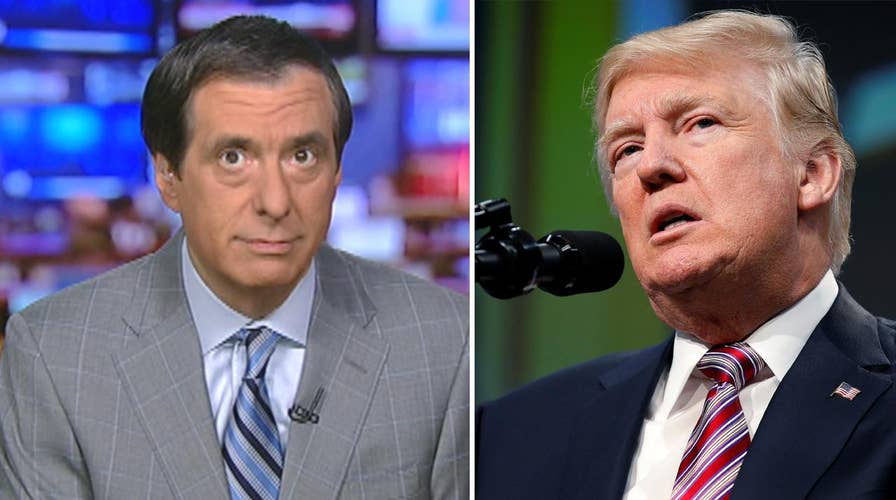Kurtz: Media blame Trump on hurricane devastation
'MediaBuzz' host Howard Kurtz weighs in on the mainstream media blaming President Trump's response to Puerto Rico's devastation while also focusing primarily on the NFL anthem protests.
It was a television moment that dramatized the plight of Puerto Rico.
CNN was interviewing the mayor of San Juan the other day and played some comments by Acting Homeland Security Secretary Elaine Duke, who was talking up the administration’s relief efforts on the island.
“I know it is really a good news story in terms of our ability to reach people and the limited number of deaths that have taken place in such a devastating hurricane,” Duke had said.
Mayor Carmen Yulín Cruz looked stunned. “Well, maybe from where she’s standing it’s a good news story,” she told Alisyn Camerota of CNN. “When you’re drinking from a creek, it’s not a good news story. When you don’t have food for a baby, it’s not a good news story. When you have to pull people down from buildings. … Dammit, this is not a good news story. This is a ‘people are dying’ story.”
The use of “good news” was tone-deaf, a la “heckuva job Brownie.” But it’s also fair to say any administration would be overwhelmed by the magnitude of this hurricane disaster. It does seem the military could have been fully mobilized more quickly, but rescuing an island that has lost all power and suffered so much damage is a daunting challenge.
President Donald Trump has hit back in a series of tweets, such as: “We have done a great job with the almost impossible situation in Puerto Rico. Outside of the Fake News or politically motivated ingrates.”
He also has criticized the mayor for poor leadership and accused her of “nasty” comments, while emphasizing the positive feedback he’s gotten from Puerto Rico’s governor and its only member of Congress, Jenniffer González Colón, who was on my show yesterday. You could sense the media’s interest rising as this turned into more of a partisan fight.
But as the media move into finger-pointing mode —”Trump Is Urged To Do Far More for Puerto Rico,” a front-page New York Times story said — they might reflect on how they fell down on the job.
For nearly a week, television news, with some exceptions, made Puerto Rico a backburner story. The big-name anchors didn’t go there, as they did after the hurricanes that hit Texas and Florida (Anderson Cooper did show up at week’s end). There were periodic live shots during the day, but the story had very little presence during primetime. Major newspapers did a better job, but on TV, severe shortages of food, water and gas didn’t rate.
I believe that started to change only after the belated realization that Puerto Rico was going to be crippled for some time to come — and that it was deemed a “better” story when the focus shifted to Trump. When the three network newscasts led with the aftermath of Hurricane Maria last week, they all did versions of NBC’s Lester Holt saying: “Growing fears of mass exodus from Puerto Rico as President Trump defends his administration’s response.”
Puerto Rico’s plight finally crept into cable primetime late last week. But what took so long?
Many journalists may have been feeling disaster fatigue after the all-out efforts on Hurricane Harvey and Hurricane Irma. And Puerto Rico wasn’t easy to get to after the storm struck.
But it’s also true that the American media treat Puerto Rico like a stepchild, largely writing it off as an impoverished place with a struggling government. Many in our country don’t know that the island’s residents are American citizens. It is impossible to imagine the same level of damage to Los Angeles — whose population of 3.8 million is only slightly higher than Puerto Rico’s — without round-the-clock coverage.
Former “Good Morning America” anchor Antonio Mora said on “Media Buzz” yesterday that there are too few Latino voices in newsrooms who might have decried the low level of coverage. But should Puerto Rico be treated only as an ethnic story?
On the first weekend when the island was digging out from the full force of the hurricane, the media were utterly obsessed with Trump’s attacks on the NFL. Rachel Maddow said on Jimmy Fallon’s show, “Three and a half million Americans in Puerto Rico, and the president was really preoccupied with trying to make a racial issue out of the NFL, while he wasn’t doing anything about that.”
It’s simply not true that Trump “wasn’t doing anything.” But while the president certainly made the football protestors a hot-button issue, the media took that ball and ran with it for days, almost to the exclusion of Puerto Rico. Reporters kept asking Trump about the NFL. CNN aired a primetime special on the controversy. So it’s myopic to simply blame Trump.
The president has been talking up the administration’s rescue efforts in recent days. But much of the media dropped the ball — big time.













































